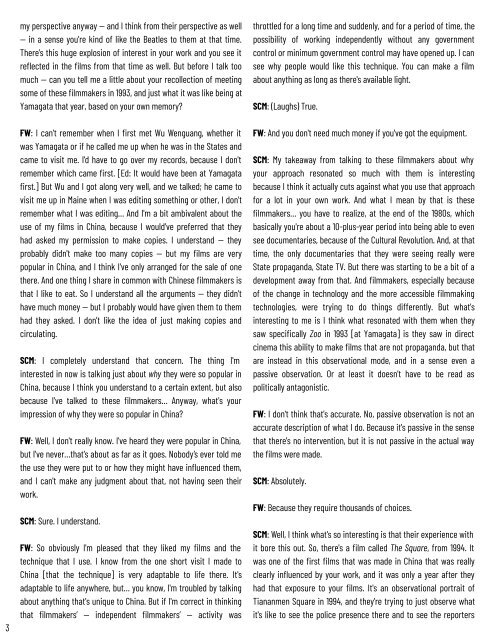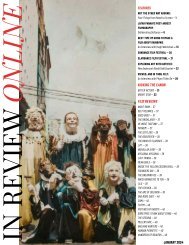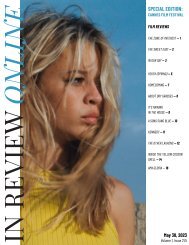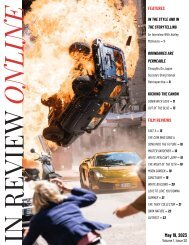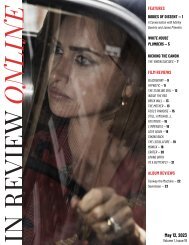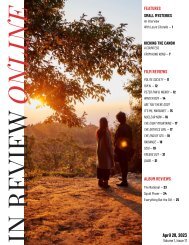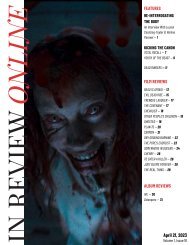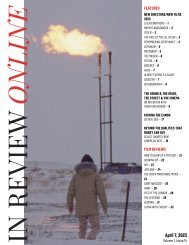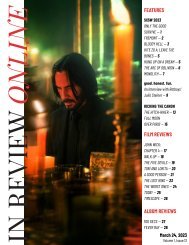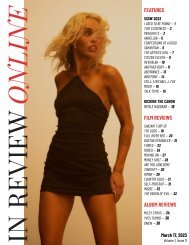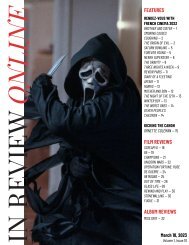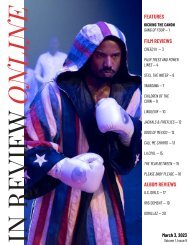Create successful ePaper yourself
Turn your PDF publications into a flip-book with our unique Google optimized e-Paper software.
my perspective anyway <strong>—</strong> and I think from their perspective as well<br />
<strong>—</strong> in a sense you're kind of like the Beatles to them at that time.<br />
There's this huge explosion of interest in your work and you see it<br />
reflected in the films from that time as well. But before I talk too<br />
much <strong>—</strong> can you tell me a little about your recollection of meeting<br />
some of these filmmakers in 1993, and just what it was like being at<br />
Yamagata that year, based on your own memory?<br />
throttled for a long time and suddenly, and for a period of time, the<br />
possibility of working independently without any government<br />
control or minimum government control may have opened up. I can<br />
see why people would like this technique. You can make a film<br />
about anything as long as there's available light.<br />
SCM: (Laughs) True.<br />
3<br />
FW: I can't remember when I first met Wu Wenguang, whether it<br />
was Yamagata or if he called me up when he was in the States and<br />
came to visit me. I'd have to go over my records, because I don't<br />
remember which came first. [Ed: It would have been at Yamagata<br />
first.] But Wu and I got along very well, and we talked; he came to<br />
visit me up in Maine when I was editing something or other, I don't<br />
remember what I was editing… And I'm a bit ambivalent about the<br />
use of my films in China, because I would've preferred that they<br />
had asked my permission to make copies. I understand <strong>—</strong> they<br />
probably didn't make too many copies <strong>—</strong> but my films are very<br />
popular in China, and I think I've only arranged for the sale of one<br />
there. And one thing I share in common with Chinese filmmakers is<br />
that I like to eat. So I understand all the arguments <strong>—</strong> they didn’t<br />
have much money <strong>—</strong> but I probably would have given them to them<br />
had they asked. I don't like the idea of just making copies and<br />
circulating.<br />
SCM: I completely understand that concern. The thing I'm<br />
interested in now is talking just about why they were so popular in<br />
China, because I think you understand to a certain extent, but also<br />
because I've talked to these filmmakers… Anyway, what's your<br />
impression of why they were so popular in China?<br />
FW: Well, I don't really know. I've heard they were popular in China,<br />
but I've never…that's about as far as it goes. Nobody’s ever told me<br />
the use they were put to or how they might have influenced them,<br />
and I can't make any judgment about that, not having seen their<br />
work.<br />
SCM: Sure. I understand.<br />
FW: So obviously I'm pleased that they liked my films and the<br />
technique that I use. I know from the one short visit I made to<br />
China [that the technique] is very adaptable to life there. It's<br />
adaptable to life anywhere, but… you know, I'm troubled by talking<br />
about anything that's unique to China. But if I'm correct in thinking<br />
that filmmakers’ <strong>—</strong> independent filmmakers’ <strong>—</strong> activity was<br />
--------------------------------------------------------------------------<br />
FW: And you don't need much money if you've got the equipment.<br />
SCM: My takeaway from talking to these filmmakers about why<br />
your approach resonated so much with them is interesting<br />
because I think it actually cuts against what you use that approach<br />
for a lot in your own work. And what I mean by that is these<br />
filmmakers… you have to realize, at the end of the 1980s, which<br />
basically you're about a 10-plus-year period into being able to even<br />
see documentaries, because of the Cultural Revolution. And, at that<br />
time, the only documentaries that they were seeing really were<br />
State propaganda, State TV. But there was starting to be a bit of a<br />
development away from that. And filmmakers, especially because<br />
of the change in technology and the more accessible filmmaking<br />
technologies, were trying to do things differently. But what's<br />
interesting to me is I think what resonated with them when they<br />
saw specifically Zoo in 1993 [at Yamagata] is they saw in direct<br />
cinema this ability to make films that are not propaganda, but that<br />
are instead in this observational mode, and in a sense even a<br />
passive observation. Or at least it doesn't have to be read as<br />
politically antagonistic.<br />
FW: I don't think that's accurate. No, passive observation is not an<br />
accurate description of what I do. Because it's passive in the sense<br />
that there's no intervention, but it is not passive in the actual way<br />
the films were made.<br />
SCM: Absolutely.<br />
FW: Because they require thousands of choices.<br />
SCM: Well, I think what's so interesting is that their experience with<br />
it bore this out. So, there's a film called The Square, from 1994. It<br />
was one of the first films that was made in China that was really<br />
clearly influenced by your work, and it was only a year after they<br />
had that exposure to your films. It's an observational portrait of<br />
Tiananmen Square in 1994, and they're trying to just observe what<br />
it's like to see the police presence there and to see the reporters<br />
--------------------------------------------------------------------------


